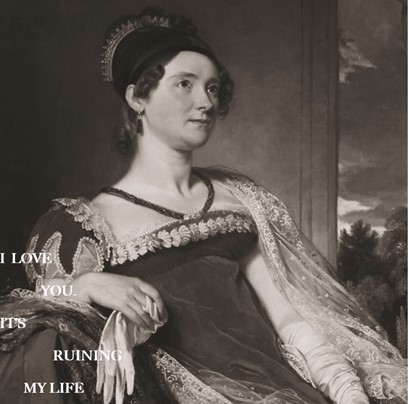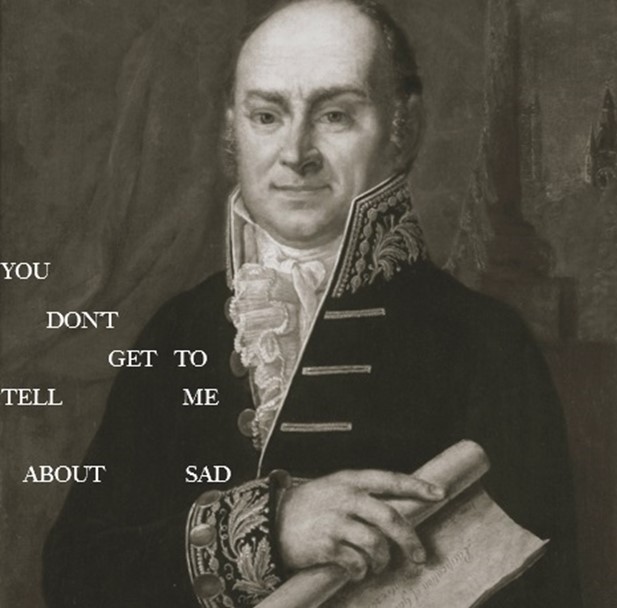By Gwen Fries, Adams Papers
With her 11th studio album, Taylor Swift introduced the world to her “Tortured Poets Department,” inducting like-minded artists to her fictional committee. After a week of assiduously studying the criteria, I have two new members to nominate. I hereby call this meeting to order.
I stand before my fellow members of the Tortured Poets Department with an application for two new members—John Quincy and Louisa Catherine Adams. I enter into evidence the following summary of my findings.

Exhibit A: Tortured — I love you. It’s ruining my life
That like the esteemed founder and chairwoman of the Department, Ms. Swift, Mrs. Adams found it difficult to balance her private life with her public demands.
In her Diary she wrote that it was “a very painful thing to me to be dragged into public notice, and made an object of debate in every company—but these are the penalties I must pay for being the Wife of a man . . . who by his real and extraordinary merits throws those who are more ambitious than himself into the shade.” (LCA, Diary, 21 Dec. 1819)
Her husband’s vocal political views on the gag rule and slavery alienated many of her loved ones in the South. “Every friend is turned into an enemy; and now the prospect terminates with the fear of losing the love, the friendship and the society of my own nearest and dearest connections.” (LCA, Diary, 21 Dec. 1835)
In private, she was tortured by the belief that her husband would have been better off married to someone else. “Few have laboured harder to correct the defects of their character than I have, or have studied their faults so keenly,” Mrs. Adams confided to her diary, “but there is a constitutional irritability about me of late years, trying to my friends and painful to myself, which is I know so disagreeable to all who live with me; it induces me to live much alone, that I may not burthen those, whose happiness I most desire in this life, and for whom I would willingly make any sacrifices to promote their welfare.”
Exhibit B: Poets
Straight from the Tortured Poets Department
That both Mrs. and Mr. Adams were lifelong poets. A catalog of their extant poetry is entered into evidence. “Could I have chosen my own Genius and Condition I should have made myself a great Poet,” John Quincy wrote on 16 Oct. 1816. “I have wasted much of my life in writing verses.”

Exhibit C: Independent Thinkers
I’ll tell you something about my good name
It’s mine alone to disgrace
I don’t cater to all these vipers
That like our esteemed chairwoman, Ms. Swift, Mr. Adams refused to be steered by the opinions of others or dominated by his reputation or the reputation of his illustrious father. As a young senator serving in the years immediately following his father’s loss to the new President Jefferson, John Quincy chose to follow his instinct rather than the party line of the Federalists who had supported his father.
On 20 Dec. 1803, Adams wrote to Joseph Hall, “When I accepted the station I hold, it was not with the expectation of giving satisfaction at all times to all my constituents.— I expected to be often censured & from various & opposite quarters.”
To his Diary, Adams declared, “I find myself of course in opposition to the federalists in general. . . . In this state of things my situation calls in a peculiar manner for prudence; my political prospects are declining, and as my term of Service draws near its close, I am constantly approaching to the certainty of being restored to the situation of a private citizen— For this Event however, I hope to have my mind sufficiently prepared— In the mean time I implore that Spirit from whom every good and perfect gift descends to enable me to render essential Service to my Country, and that I may never be governed in my public conduct by any consideration other than that of my duty.”
Exhibit D: Florida!!!
No one asks any questions here
That as Secretary of State, Adams negotiated the Adams-Onis (Transcontinental) Treaty, convincing Spain to relinquish Florida to the United States. Without this intervention, the chairwoman, Ms. Swift, would have nowhere to go when she “need[s] to forget” and to “bury” her “regrets.”
The above evidence is respectfully submitted to the Department.
Sincerely,
Gwen Fries
The Adams Papers editorial project at the Massachusetts Historical Society gratefully acknowledges the generous support of our sponsors. Major funding for the John Quincy Adams Digital Diary was provided by the Amelia Peabody Charitable Fund, with additional contributions by Harvard University Press and a number of private donors. The Mellon Foundation in partnership with the National Historical Publications and Records Commission also supports the project through funding for the Society’s digital publishing collaborative, the Primary Source Cooperative.

